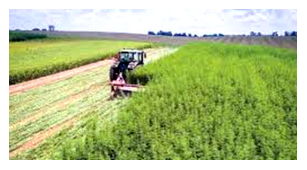Farming For a Clean Energy Future?
Carbon Analytic continues to focus on alternate biomass crop cultivation. Industrial hemp is our choice field crop for biomass fuel in combination with arbor cultivation and food production.
Cultivated biomass refinement is the response to earlier failed efforts decades ago in energy production to use biomass as an alternative to fossil fuels.
 Several types of raw materials come from industrial hemp, such as fiber, seed and oil . Our fuel product is refined from ‘hemp straw’ or the inner hurd, a waste by-product of the fiber crop.
Several types of raw materials come from industrial hemp, such as fiber, seed and oil . Our fuel product is refined from ‘hemp straw’ or the inner hurd, a waste by-product of the fiber crop.
Isn’t hemp a controlled substance? No. Commodity hemp production was federally legalized under the 2018 United States Farm Bill. It is a non-narcotic, non-psychoactive group of species.
Can biomass fuels really support conventional, on-demand fuels? Yes. Ultra-refined biomass fuels and power technologies from Carbon Analytic produce clean power, hydrogen or neutral methane 24/7. They’re capable of supporting wind and solar during 'down cycles', i.e. at night or when winds are low. Because precious fossil reserves are finite, an organized transition to biomass sources where possible needs to be considered to maintain financial interests in the energy sector and a return from human effects impacting climate stability.
Is it realistic to think we can clean the air while generating power? Certainly. In general, combustion generates CO2 and water vapor (also a serious greenhouse gas). As plants grow, they store these ‘greenhouse elements’ into the soils as humus, or 'black dirt'. Burning ancient, underground fossil fuels push these emissions gases from the distant past into our contemporary climate system. Carbon Analytic technologies generate clean power using fuels from this geologic era. These biomass fuels have already deposited more greenhouse elements to the soils during growth than they emit from combustion. For these reasons the process can be considered pollutant net-negative. The soil systems and atmosphere are left cleaner than we found them!
Doesn’t growing biomass fuels cut into food production? No. Hemp thrives on marginalized (desertified) acreage with minimal care and many forms of trees are suited to develop as land and water is restored. Hemp is an ideal crop for reclaiming poor soils, especially when sown in semi-annual rotation with crops such as clover. This is a regenerative (soil building) process which prepares lands for sustainable food production when needed.
To learn more about CA Hemp Biomass Cultivation: The Hemp Biomass Fuel Solution:
